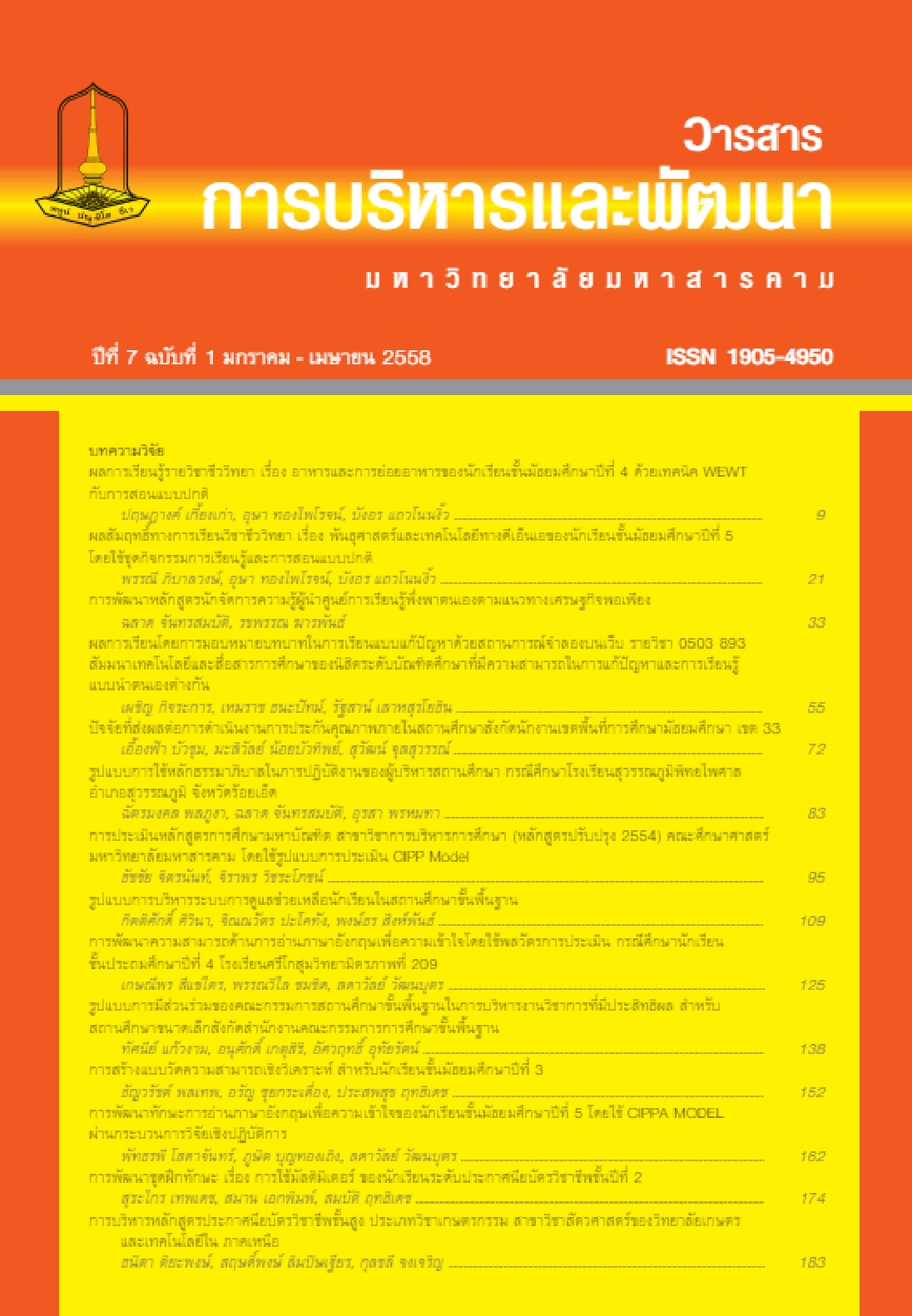Learning Effects of Roles Assignments via Web-Based Learning Entitle 0503 983 Seminar in Educational Technology and Communications of Graduate Students toward Different Levels of Problem Solving Abilities and Self-Directed Learning
Main Article Content
Abstract
The purposes of this study were to develop simulated problem solvingweb-based instruction entitle 0503 983 Seminar in Educational Technology and Instruction with an efficiency of 80/80, to compare students’ critical thinking and analytical thinking between before and after learning, to compare students’ critical thinking, analytical thinking and learning achievement between different levels of problem solving abilities and self-directed learning. The sample used in this study consisted of 46 graduate students majoring educational technology and communication who were enrolled in the 3/2012 semester. The research instruments were a web-based instruction using problem solving process with simulation learning, a problem-solving ability test, a self-directed learning test, a critical thinking test, a analytical thinking test, an achievement test, and a questionnaire of learning satisfaction. The data were analyzed using arithmetic mean, standard deviation, and t-test. The research results were as follows: the developed WBI had an efficiency of 81.10/80.65 which met the criterion 80/80. The 1st year graduate students have had the critical thinking abilities, and the analytical thinking abilities posttest’s mean scores higher than pretest’s mean scores with significant difference at the .01 level. The high levels of problem solving and self-directed learning abilities students studied a role assignment by web-based instruction using problem solving process with simulation learning had higher critical thinking abilities, analytical thinking abilities and the learning achievement than the lower ones at .01 level of significance. Finally, The students’ satisfaction who studied through a role assignment by web-based instruction using problem solving process with simulation learning mean score, as a whole and in each aspect, were at a high level.
Downloads
Article Details
References
Chaiyod Reangsuwan. (2011). Design, Develop Lessons and Tutorials on the web. 15th Edition. Mahasarakham: Department of Technology and Communications Mahasarakham University.
Dararut Makmeesub (2011). Education The Critical Thinking and Achievement Learning Combination Model By Problem Solving Academic Selection And Using the Medium of Instruction of Undergraduate. Thesis M.Ed.: Nakhon Pathom ; Silpakorn University,
Dixon, A. (1992). Parents: Full partners in the decision-making process. NASSP Bulletin, 76(543), April 15-18.
Dungreathai Buakhumkerd (2011). A Comparison of Achievement Between Training on the web with Normal Training Subject Skills to make a success of their students Mattayomsuksa 4. Thesis M.Ed. Mahasarakham: Mahasarakham University.
Ge, X., & Land, S. M. (2003). Scaffolding Students’ Problem-solving Processes in an Ill-structured Task Using Question Prompts and Peer Interactions. Educational Technology Research and Development, 51(1), 21-38.
Kelton, W. David. & Barton. Russell R. (2003). Experimental Design for Simulation: Experimental Design for Simulation. Proceedings of the 35th Conference on Winter Simulation: Driving Innovation. p. 59-65.
Lumpkin. GT. & Erdogan. B. (1999). If not Entrepreneurship, can Psychological Characteristics Predict Entrepreneurial Orientation? A Pilot Study. Proceedings of the USASBE/SBIDA Annual National Conference-Sailing the Entrepreneurial Wave Into, San Diego, California.
Maria, Anu. (1997). Introduction to Modeling and Simulation. State University of New York at Binghamton, Department of Systems Science and Industrial Engineering, Binghamton, NY.
Naran Musikbunlead. (2007). The Relationship Between the Ability to Solve Problems Critical Thinking Abilities And Features that Enhance the Students’ Research Bachelor Degree of University in Nakhon Pathom. Thesis M.Ed. Department of Development Studies Silpakorn University.
Nittaya Seenakhen (2007). Learning Management by Problem Solving Activities Learning Teaching Model Combination In 2 Department of Accounting For Development Achievement And The Ability to Analyze Degree Diploma Year 1. Thesis M.Ed. Songkhla: Songkhla Rajabhat University.
Phaiboon SeeThoob. (2010). Development Lesson Computer For Training via web Subject The use of video Conferencing Lawrence Between Physician And Authorities Health Station Public Health Network Aumphur Thuptan. Master of Industrial Education (M.I.Ed.): Department of Computer Technology King Mongkut’s University of Technology North Bangkok.
Royal Thai Embassy in Washington, DC. (2013). STEM Education Innovation, Science and Technology Education. - See more at: http://www.krusmart. com/stem-education-innovation thailand/#sthash -.wVgVdO5l.dpuf.
Surachet Kaewtubthong. (2011). Effects of Training on the Web For Performance Media Production E-Learning of Students Preparing to Teach Operating. Thesis M.Ed.: Pattani Faculty of Education ; Prince of Songkla University.
Sutee Phongsakunchai and Narong Lumdee. (2009). Web technology. Bangkok: KTP.
Tanadol Phoosreerid (2007). A Comparison Learning Outcomes And Creativity Thinking From Lessons on the Network Course Multimedia Production Between Students Learning Individually And Learn a Couple. Thesis M.Ed.: Mahasarakham: Mahasarakham University.
Wichai Tonsiri (2000). Explanation Education Act of 2542. Bangkok: Say than
Yean Phooworawan And Somchai Numpraserd. (2008). ICT For Education Thailand. Bangkok: C-ed-Ucation.


